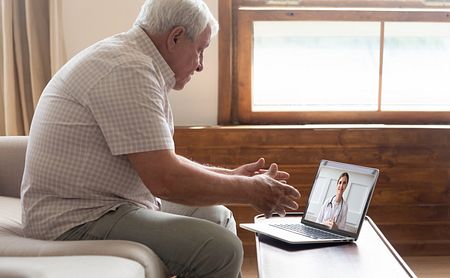Medicare Adds Speech, Oral Therapy to Telehealth Services

Speech and oral therapy were added to covered services available by telemedicine for people with amyotrophic lateral sclerosis (ALS), which Medicare previously recognized only as in-person visits, during the COVID-19 pandemic.
Medicare will now reimburse — at least through December 2021 — evaluations and treatments given by telemedicine that include those for swallowing and other oral problems related to eating, a one-hour evaluation for speech-generating devices, and therapeutics services like programing and modifying those communication devices.
Services that address a patient’s hearing and cognition are also included. A complete list of covered services can be found here.
“These changes will allow speech therapists at ALS clinics and throughout the country to continue treating patients in the safety of their homes and cover services that can be done effectively using telehealth,” Kathleen Sheehan, vice president of public policy for The ALS Association, said in a press release.
This temporary authorization, made by the Centers for Medicare and Medicaid Services, is retroactive to Jan. 1 and will be available until the end of the public health emergency, declared in response to the ongoing pandemic.
Coverage is expected to last at least until year’s end, but the ALS Association — which worked with the American Speech-Language-Hearing Association to add these services to the Medicare telehealth coverage list — is pushing for them to be made permanent.
The ALS Association recently endorsed the Telehealth Modernization Act, which aims to retain telehealth access for all Medicare beneficiaries, among other service expansions. Twice introduced to the U.S. Congress, the bill is now in committees in both the Senate and House.
The American Hospital Association and the American Telemedicine Association have also endorsed the bill.
The ALS Association also submitted written supporting testimony to the House Energy and Commerce Committee, explaining the importance of telehealth services to people with ALS due to a loss of mobility that complicates travel. Testimony also addressed needs in regular medical care and for increased opportunities to participate in clinical trials, which can potentially provide patients with more effective therapies.
Although telehealth cannot replace all types of required care, the association noted, it provides a safe and efficient way for physicians’ to monitor changes in their patients’ conditions — including in their ability to eat and breathe — and to make necessary adjustments in treatment plans.
“People living with ALS have experienced expanded access to ALS multidisciplinary care across state lines in a way that was not possible before COVID,” the ALS Association wrote.
AHSA encourages people to contact their members of Congress, and to voice their support for permanently authorizing the Telehealth Modernization Act.






